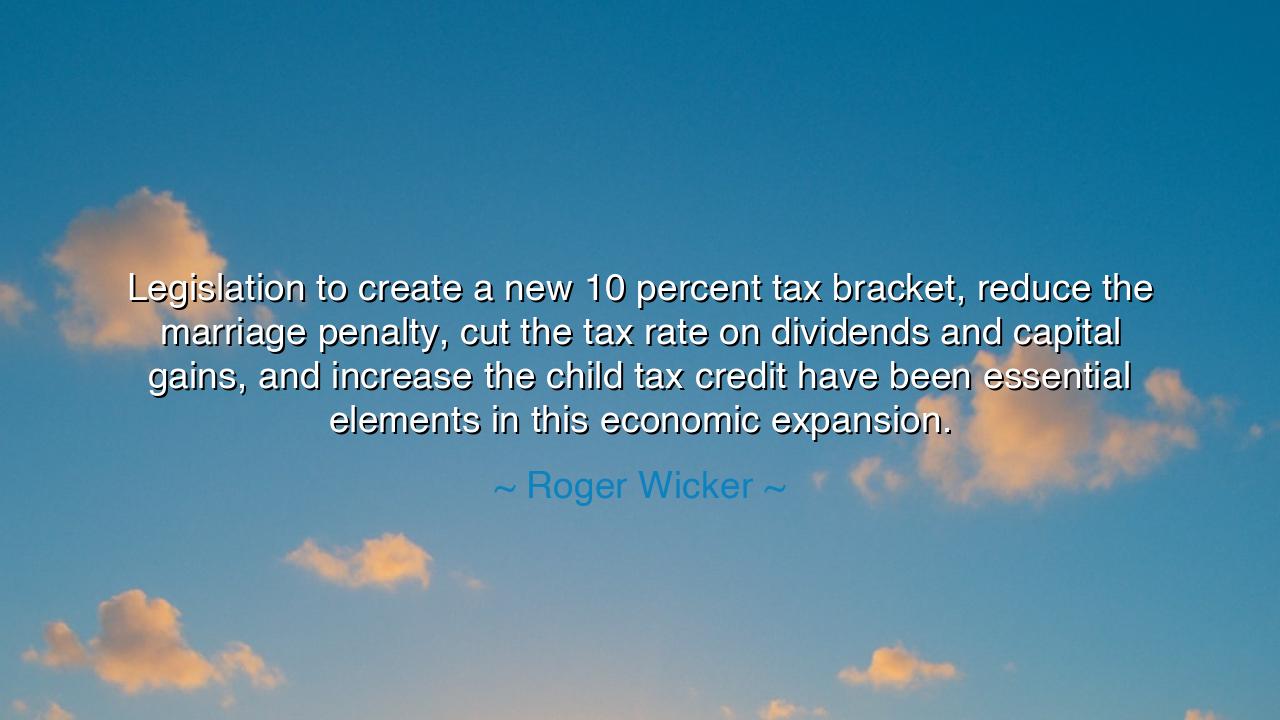
Legislation to create a new 10 percent tax bracket, reduce the
Legislation to create a new 10 percent tax bracket, reduce the marriage penalty, cut the tax rate on dividends and capital gains, and increase the child tax credit have been essential elements in this economic expansion.






Hear now the words of Roger Wicker, a voice shaped by governance and vision, who proclaimed: “Legislation to create a new 10 percent tax bracket, reduce the marriage penalty, cut the tax rate on dividends and capital gains, and increase the child tax credit have been essential elements in this economic expansion.” Though his words are rooted in the language of policy, their deeper meaning touches upon the eternal balance between justice and prosperity, between the duty of leaders and the wellbeing of the people. In this, his statement becomes not merely economic, but philosophical — a reflection on how the laws of men may nurture or neglect the lives of families and the heart of a nation.
For in every age, the state is tested by how it distributes burden and opportunity. Taxation, though often spoken of in dry arithmetic, is in truth a mirror of moral order. To create a fair system — one that lifts the weak without breaking the strong — is among the highest arts of governance. When Wicker speaks of reducing penalties upon marriage, of easing the weight upon parents and workers, he invokes a timeless principle: that the fruits of labor must not be devoured by the hand that governs, but preserved to sustain the hearth, the child, the future. Such legislation, he reminds us, is not mere paperwork, but the crafting of destiny.
Throughout history, rulers have learned — some too late — that a nation’s greatness depends not upon the wealth of its treasury but upon the stability of its people. The Emperor Augustus of Rome, after years of civil war, knew this truth. He reformed the laws of family and finance alike, understanding that the strength of Rome did not rest solely in its legions, but in the prosperity of its citizens. By encouraging marriage and protecting inheritance, he sought to bind civic virtue with domestic peace. In this ancient mirror, we see reflected Wicker’s own insight — that economic expansion is not born from greed, but from trust, fairness, and wise stewardship.
When Wicker speaks of the 10 percent tax bracket and the child tax credit, he gestures toward a vision of inclusion — a system where even the modest worker feels the presence of justice. The economic expansion he describes is not the triumph of a few, but the flourishing of the many. For what use is growth if it feeds only the elite and leaves the rest to hunger? True expansion, as the ancients would say, must lift all boats in the tide, not drown the smaller vessels in the wake of the great. Thus, the lawgiver must think not as a collector of coins, but as a gardener of nations — nurturing the soil where families may root, where ambition may flower, where every child may find shade and sustenance beneath the tree of prosperity.
But this truth comes with warning. When power forgets its purpose, when law becomes an instrument for privilege instead of protection, the heart of the nation sickens. History speaks clearly: empires that taxed unfairly or ignored their common people crumbled from within. The lesson of Athens after the Peloponnesian War, or France before its Revolution, is not simply about rebellion — it is about neglect. Those who govern must remember that economic justice is not charity; it is survival. A house divided between the wealthy and the weary cannot stand long in peace.
Thus, the quote of Roger Wicker stands not only as praise for past legislation, but as a call to every future leader: build your laws upon fairness. Let taxation be a covenant, not a curse. Let prosperity be a shared fire, not a hoarded flame. And let the balance between productivity and compassion guide every measure that bears the name of progress. For the strength of a nation is not found in numbers, but in the dignity of its households.
So let the wise take heed: seek always to govern with mercy, to legislate with foresight, and to remember that behind every statute lies a soul — the laborer, the parent, the child. Protect them, and they will build your empire. Forget them, and no law, however cleverly written, can save it. For as the ancients knew and the moderns must remember, prosperity built upon justice endures; prosperity built upon greed turns swiftly to dust.






AAdministratorAdministrator
Welcome, honored guests. Please leave a comment, we will respond soon